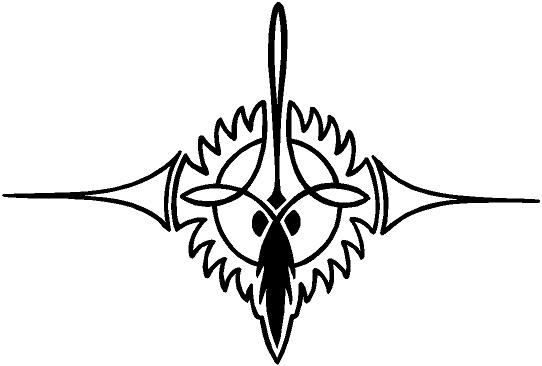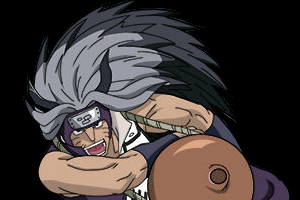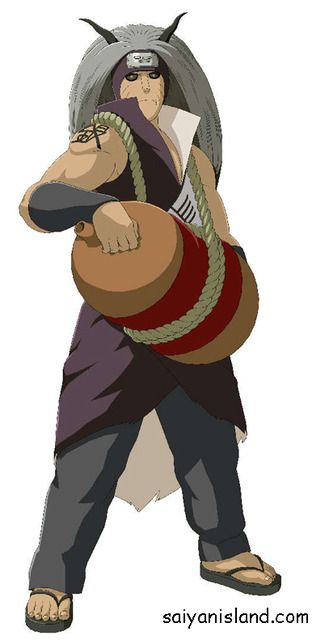Post by Deleted on Jul 6, 2016 3:02:12 GMT -5
 Zenku |
CLAN TYPE: Hiden VILLAGE: Suna ORIGIN: Kaze no Kuni CLAN HISTORY: -- In Kaze no Kuni in the ancient times before the feudal lords and the formation of ninja villages had even occurred to anyone there were the people no one knew what they were called back then and have since just referred to them those who came before. Numbering tens of thousands in number they couldn’t farm in the wastes and they sucked the hunting dry as quickly as they could move. They began to worry that they were too large and would eventually die out due to the lack of natural resources in their homeland. The years ticked by slowly, with much hardship but much spiritual fulfilment and an abundance of freedom for the dwellers on the plains. The people of the desert were skilled in their arts, their hunting was motivated by desperation and so they became adept early at moving far and wide around the great plains of their families to try and get the meat and water necessary for survival. This was when the thought it best to separate in order to need less and hunt less and spread out more in order to save their lands and their people. This worked for many generations until eventually they forgot that they were once one large tribe and began warring for territory. It was ironic then that what has since been seen in legend as almost tragic was in fact the greatest thing that could happen in order to preserve their beloved way of living: The war nearly drove them to extinction which gave the areas around them more time to thrive while also cutting down on the supplies needed as there were only a couple hundred left of those that came before. They were all strong, proven war leaders that had many pledged to them that they had led against the rival tribes of the plains numerous times. The people were divided, angry, and almost at blows. But none were willing to settle the matter with bows and spears in the wake of the death of their people, eventually there was so few of them that they decided to merge and become whole once more They united and seemingly disappeared from this annals of history after doing so not much else being said about them other than whispers and legends that cannot be confirmed. That is until more recent years when the shinobi began to war among themselves and the fighting bled out into their desert. This was the formation of the first Zanku clan which is said to be the direct descendants of those who came before. Whether or not this is true remains to be seen however what is true is that the Zanku have a spirituality and unique skillset that is extremely similar to the legends told of those who came before. They showed up in a time of strife and defended their land which placed them on good terms with Kaze No Sato at first. Once the bulk of the defense was done and other clans of Kaze no Kuni turned on the Zanku this was done mainly due to the fact that most other clans thought of them as savages and figured they could not be trusted. The fighting was long and bloody until the clan of Kaze no Kuni offered an olive branch or so it seemed. Saying that they wished to untie again and be on the same side they gifted the tribes with blankets (yeah I went there) only for the tribe to find out the blankets were infected with disease. This weakened the clan into the 20 or 30 members that the clan is today and also gave them a drive to push themselves to bring their clan their former glory. The clan would have completely died out however those of Kaze no Kuni told the tribes that they could create a cure and would do so if they swore to forgive and forget as well as join forces with them to defend against the ten tailed menace. Wanting to be rid of the disease that was slowly killing them off and wanting to rid the world of the ten tails the tribe accepted the offer. Even after the war with the ten tails the Zenku have kept their word and although they never forgot they did forgive to the point where when the time of the creation of a ninja village in Kaze No Kuni they were asked to join and they happily accepted. They have decided to work in harmony with those who once burned them rather than to hold on to the sickness that is revenge. They much rather focus on making their clan great again rather than remember and festering over old wounds. As the adage says a scab won’t heal if you continue to pick at it. CLAN IDEOLOGY: -- The Zenku are not a clan in the traditional sense of how most regard clans, they are less a single clan and more a separate ethnicity in themselves. They are divided up into various tribes that are scattered along the deserts, canyons, and wastes of Kaze no Kuni to the extent where if it isn’t built on and settled they will most probably pass on through. They are rarely at war with one another in the traditional manner, though if one tribe strays too far into another's territory that usually means conflict to some extent with the warriors of both tribes clashing in hit and run attacks. Tribes are completely autonomous from one another and eke out an existence of the nomadic sort by leaving an area when the hunting in it becomes scarce to another area where they hunt until they have to move again; which usually leaves them moving from six to eight times a year. The nature of the people means that they don't have a last name, though when among those not of the Tribes they will usually just give their family name as that of their people. As they have found that not having a surname in village standards makes things much more difficult. The total population of Zenku came to around 150,000 though after being the front runners in the war for Kaze no Kuni as well as constant skirmishes with the ten tails and his clones the numbers have dwindled. Each tribe is split into bands of about 400 people due to the necessity of not living where there isn't enough food, in essence they would starve if a tribe was to gather together all it's numbers at once. Which is dangerous for the fragile environment that they live off of. Zenku Society has a few constants from Tribe to Tribe across the massive desert, they practice certain things across the width and breadth of every nomadic group of them. The major practice that is a constant is Polygamy, The tribes practice this for a very simple reason, and that reason is for the purposes of practicality. It is impossible to ensure enough warriors and hunters that each tent can have one to provide for those that are not martially or hunting inclined. So Polygamy is a simple solution, it ensures that every household can count on having a male warrior to provide for the women; this isn't the only way around it works but usually this is the far more common occurrence as opposed to women having multiple husbands though mainly this is because practicality and because that form of polygamy doesn't expand the numbers of a Tribe any faster and instead opens up for a female warrior to be unable to fight or hunt while pregnant which could leave a household hungry if the males were to be the ones that mainly stayed at home. Children aren't too closely paid attention to in the tents of the Zenku, mainly because as long as they are safe and fed the philosophy of most parents is that they will pick up their skills by playing among themselves, observing and following the warriors, and by simply practicing and going out on expeditions themselves into the desert once they reach a certain age, though with other youths of their own age. A tribe of Zenku won't attack a group of youths straying far from the camp, mainly because it's seen as a horrific crime to do so and partly because there's no honor in killing the young that haven't become full warriors yet. It's down to the adult fighter and hunter of the tent to teach them the skills of survival and ensure they turn out strong, meaning that there is some formal training at a young age though it doesn't take the appearance of lessons found in the academy and instead is far more subtle and less explicit in its purposes. All Zenku Hunter Warriors have a lust to prove their bravery in battle, bravery that are expected from their elders and their peers and is vital for ensuring the continued survival of a Tribe. While killing an enemy in battle is thought of as a worthy act and a significant show of battle skill, greater honor is claimed and earned by warriors who can get close enough to his enemy to touch a vital spot with the tip of one of their weapons in a mock death blow and then return to safety; all without hurting the one they touch in this manner. This is known as a coup. Coups are always carefully counted during warfare and war trophies were put on display such as the notches on a warriors spear or by valuable status symbols such as eagle or hawk feathers to put into ceremonial headdress. War paint is used to daub Tribal markings on the side of a warrior's horses to indicate the number of coup counted by them, enemies killed and horses captured in their time. If a warrior has a coup performed on them they are shamed, and when spoils of war claimed they must make a gift to the one that embarrassed them so, or their household must if they are later killed and the goods passed on. In war with other Zenku Tribes there are rules that they all accept, unofficial but if broken will earn much resentment by all Zenku kind, children and Elders and other non combatants are not to be harmed. Only a fifth of total goods and material possessions may be taken as spoils of war from another Zenku tribe excluding prizes taken as tributes from individuals due to Coups. These rules are simple and small, though they are iron, and although merely convention breaking them would mean certain doom for the Tribe. However these rules only apply when fighting other Zenku Tribes, with other wanderers not Zenku there are no rules, merely that of strength as such civility is regarded as only for War between the true sons and daughters of the desert. Death is a constant threat in the tents, the threat of hunger or the threat of no water causing them to die of thirst in their tents though they are surrounded by lots of game. As a result water is taken very seriously, as a valuable necessity that literally means the difference between life or death in a far shorter term than food deprivation means that Zenku treat water and Oasis with great respect. It is forbidden to jump in or wash oneself in a pool of water no matter the circumstances. The Zenku bathe when they have to through the use of steam, taking buckets of water inside thick tents on cold nights they strip down and allow the steam to make them sweat and so use that and the water that beads on them to scrape the dirt from their skin. This results in the most serious of oaths for the Zenku, they will swear oaths over water; and these are oaths that if not kept they are sure will result in bad omens to follow the oath breaker and their descendants, as well as this it is reckoned that it shows ungratefulness for what water the desert provides and so will earn the ire of the great desert spirit. Though death itself is treat very matter of factly, for warriors it is seen as a good death and their body is burned with honor and their worldly goods pass down to their youth. For elders some may weep but usually the fact they had such long happy lives outweighs that and so they merely sing dirges for the deceased and grieve little. An unusual thing is that warriors by some unwritten code never sing, this is true across all tribes and though songs of grief for parents and elders may be sung they only break this unwritten rule for the glorious war dead and for singing songs of war and glory. This usually means that Zenku war songs are rather badly sung to outsiders, especially in the more guttural sounding of the Tribal languages though they are all rousing and the words themselves are unusually poetic for the most part. CLAN ABILITIES: -- Beast Masters (Optional SA) The Zenku for the most part of a sort of natural magnetism for animals. This extends to even the trained NInja animals and summons though on a much smaller scale than it does for wild animals. Wild animals seems drawn to most members of the Zenku clan and it is not unheard to see packs of wild animals that sort of adopt the clan as their own and begin to travel with certain members of the clan. Many members of Suna have asked the Zenku why they do not train these wild animals in the ways of the ninja so they could be proper ninja companions but the Zenku refuse as they believe that while wild animals lack the intelligence and ability to use chakra like ninja animals their senses and wildness come in handy for the way the Zenku prefer to use them. This SA does not appear in all members of the clan (and just because you don't have it does not mean you cannot have wild animal familiars) those that do have it however have an easier time controlling wild animals and can even influence other familiars and even summons to an extentTamashi Hoko [Spirit Walking] The Zenku have also honed and perfected their use of chakra over the years. Because of this they have been able to create a method of fighting that is unique to them. They call it Tamashi Hoko or spirit walking. This allows the Zenku member to strengthen and shape their chakra into constructs that are not only visible but also tangible. While this is far from being able to make living beings they can use their control over chakra to make the constructs move in simple ways. This cannot be done free form and require jutsu to produce. The Zenku use this ability to manifest their spirits and use them in aid for battle their are many ways this can be used and is as versatile as the Zenku using it makes it out to be. CLAN HIERARCHY: -- The Tribe elects their chief via a popular vote by all those whom are considered adult (which can be any age and there are some that are not considered adult no matter how old they are) and once a chief has been elected they are at most first among equals. They rule via respect though they can't force a Tribesmen to do anything they don't want to; a Chief that doesn't stick to that and instead tries to assert themselves as a dominant force over their Tribe without question will soon find their authority in tatters. All in all this means that a Chief is only as powerful as his Tribe allow him to be, which usually means that ironically the ones that don't try to force their way usually end up getting more easily followed than those who aren't as laid back in exercising their powers. The Elders of a Tribe form a council that also includes the Tribal shaman and the medicine man and other figures of import, and using their wisdom they advise a Chief on important decisions such as where to migrate to, whether to accept peace or fight on in war, and even whether or not to go to war in the first place. A Chief will never go with a course of action without consulting these bountiful fountains of wisdom, and to even think about pursuing a course of action that could have far reaching consequences for the Tribe without talking it over with the Elders would not only look bad but almost tyrannical. The Tribesfolk definitely wouldn't support the action if they heard, at least not until this process has been gone through. They are far from a kratocracy, they recognize in their Tribes that the strongest warrior isn't always going to be the best leader, and so while brave fighters may be showered with praise and given positions of leadership of raiding parties in times of war Tribesmen and women rarely let a reputation as a good warrior blind them to whether or not someone could in fact be good enough to lead their tribes to prosperity. MEMBERS: Clan Chief: Akaikyofu Zenku Clan War Leader: Clan Shaman: Clan Medicine Man/Woman: Clan Priest/Priestess: Clan Member: Clan Member: |


